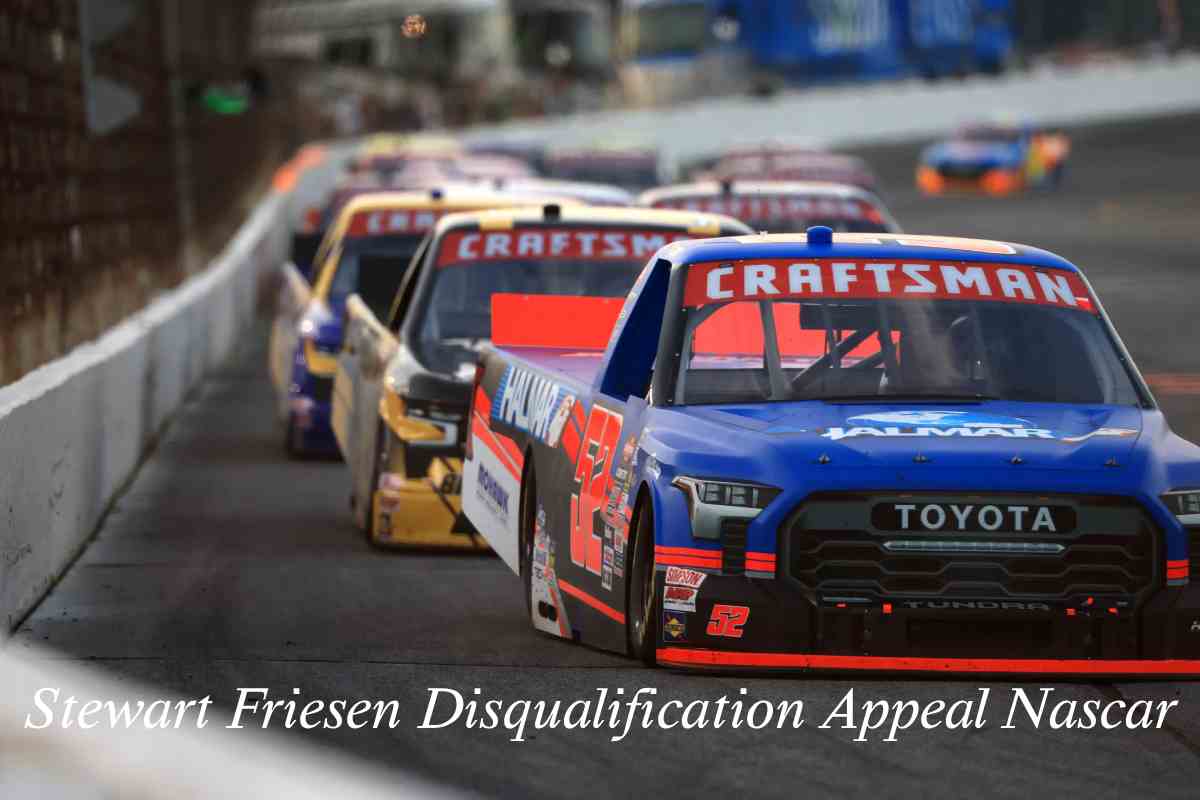When you hear about a NASCAR disqualification, it usually means something serious happened on the track—or under the hood. That’s exactly the case with Stewart Friesen, one of the most well-known drivers in the NASCAR Craftsman Truck Series, who found himself in the headlines after being disqualified following a race. The shocking part? Friesen and his team decided not to just accept the penalty—they appealed it, sparking a heated discussion among fans and insiders alike.
In this article, I’ll break down what happened with Stewart Friesen’s disqualification appeal, why it matters in NASCAR, and what it could mean for the future of racing rules.
Who Is Stewart Friesen?
Before diving into the controversy, let’s talk about the man at the center of it all.
Stewart Friesen is a Canadian-born driver known for his aggressive yet smart racing style. Competing full-time in the NASCAR Craftsman Truck Series with Halmar Friesen Racing, Friesen has earned a reputation as one of the sport’s top dirt-track racers. He’s also known for his strong performances at venues like Eldora Speedway and Knoxville Raceway.
Fans love him for being a blue-collar racer—someone who built his career from the ground up. That’s why his recent disqualification and appeal hit so hard for those who’ve followed his journey.
What Led to Stewart Friesen’s Disqualification?
The drama started after a NASCAR Truck Series race, when officials announced that Stewart Friesen’s truck had failed post-race inspection.
The reason? According to NASCAR, there was an issue with the vehicle’s suspension components—specifically, parts that didn’t meet the technical specifications laid out in the rulebook.
In NASCAR, any deviation from the approved setup, even if it doesn’t give a clear performance advantage, can lead to serious penalties. And that’s exactly what happened here: Friesen’s team was disqualified, stripping him of his finishing position and any points earned.
NASCAR’s Strict Inspection Rules
To understand why the ruling was so firm, you need to know how strict NASCAR’s inspection process is. After every race, several top-finishing vehicles undergo a post-race teardown—a detailed inspection that checks everything from the suspension to the fuel system.
If a team is found to have non-compliant parts, even unintentionally, NASCAR can issue penalties such as:
- Disqualification (DQ)
- Loss of championship points
- Crew chief suspensions
- Fines (often thousands of dollars)
In Friesen’s case, officials determined that a suspension component did not match the legal specifications. While the team argued that it wasn’t an intentional rule break, NASCAR held firm on its disqualification.
Why Stewart Friesen’s Team Filed an Appeal
The disqualification didn’t sit right with Halmar Friesen Racing. The team immediately announced their decision to appeal the ruling, claiming the issue wasn’t performance-enhancing and possibly a misunderstanding of parts tolerances.
Here’s what the appeal meant:
- They believed the part in question met the intent of the rules.
- They wanted NASCAR’s National Motorsports Appeals Panel to review the evidence.
- They hoped to have the disqualification overturned or reduced.
Friesen’s crew chief and engineers reportedly worked closely with NASCAR officials to prepare their case. It wasn’t just about one race result—it was about protecting the team’s reputation and ensuring fairness in how the rules are applied.
NASCAR’s Appeals Process Explained
If you’re not familiar with NASCAR’s disciplinary process, here’s how it works:
- Penalty Issued – NASCAR announces the infraction and corresponding penalty (in this case, disqualification).
- Notice of Appeal – The team officially notifies NASCAR of their intent to appeal within a short window.
- Appeals Hearing – A panel of three independent experts (not employed by NASCAR) hears both sides.
- Decision – The panel can uphold, modify, or rescind the penalty.
- Final Appeal (optional) – If the team disagrees with the outcome, they can take it to the Final Appeals Officer, whose decision is binding.
Friesen’s team went through this process, arguing that the suspension issue didn’t give them a competitive edge.
The Outcome of the Stewart Friesen Appeal
After the review, the NASCAR Appeals Panel upheld the original disqualification. That meant Stewart Friesen’s result in that race remained nullified, and the team lost the championship points associated with it.
While disappointing for Friesen and his fans, the panel’s decision sent a clear message: NASCAR will enforce its technical rules consistently, regardless of intent.
Halmar Friesen Racing expressed their frustration but also respect for the process, saying they would “move forward and focus on the next race.”
How This Impacts Stewart Friesen’s Season
In NASCAR, every point matters—especially in the Truck Series, where playoff spots can come down to a few points. Losing those points due to disqualification was a setback for Friesen’s championship hopes.
Here’s what it meant in real terms:
- Loss of stage points and finishing points from the race
- Potential drop in the driver standings
- Missed opportunity for sponsorship exposure
However, if there’s one thing fans know about Friesen, it’s that he doesn’t quit. The setback might hurt in the short term, but he’s bounced back from tougher challenges before.
Fan Reaction: Divided but Passionate
The NASCAR community had mixed feelings about the whole situation.
Some fans sided with Friesen, believing the disqualification was too harsh and that the infraction didn’t significantly affect performance. Others applauded NASCAR for holding every team accountable, regardless of status or popularity.
On social media, the conversation was intense—hashtags like #FreeFriesen and #NASCARRules trended briefly among fans and racing pages.
Why This Case Matters for NASCAR
Beyond one driver’s race result, this situation highlights some important issues in modern NASCAR:
- Transparency in rule enforcement – Fans and teams want clear explanations of why a part is deemed illegal.
- Consistency across teams – Smaller teams often feel larger ones get leeway; this case shows that everyone is subject to the same rules.
- Balancing performance and intent – Should a driver be punished equally for an honest mistake versus an intentional modification?
These are ongoing debates within the NASCAR world, and Friesen’s case reignited them all.
Lessons Other Teams Can Learn
Friesen’s disqualification serves as a cautionary tale for other teams in the Truck Series—and across NASCAR.
Here are a few takeaways:
- Double-check all components before inspection, even if they seem within limits.
- Keep documentation on every part used, especially custom or third-party components.
- Communicate with NASCAR officials during setup to avoid gray areas.
In a sport where milliseconds decide victories, the line between innovation and violation is razor-thin.
Stewart Friesen’s Response
Friesen handled the situation with class. In interviews, he expressed disappointment but avoided blaming officials directly. Instead, he focused on the team’s resilience and determination to finish the season strong.
He said something along the lines of: “We’ll learn from this and come back better. Our team’s built on hard work, and one race won’t define us.”
That’s the mindset fans love—and it’s why Friesen continues to be one of the most respected drivers in the garage.
What’s Next for Stewart Friesen?
After the appeal decision, Friesen and his team quickly turned their attention to upcoming races. With the playoffs in sight, they couldn’t afford to dwell on the setback.
Here’s what to expect from him moving forward:
- More aggressive racing to make up lost points.
- Tighter pre-race inspections within the team.
- Continued focus on dirt-track venues, where he often excels.
The disqualification might have slowed him down—but it definitely hasn’t stopped him.
The Bigger Picture: NASCAR’s Integrity
For NASCAR, cases like this one are about maintaining the integrity of competition. The sport relies on fairness and consistency, ensuring no team gains an unfair advantage.
Even though it’s frustrating for drivers and fans, strict enforcement helps keep racing credible. When you know everyone plays by the same rulebook, victories feel earned—not engineered.
Final Thoughts: Stewart Friesen’s Disqualification Appeal NASCAR
In the end, the Stewart Friesen disqualification appeal NASCAR story isn’t just about one race—it’s about the balance between competition, innovation, and fairness in motorsports.
While Friesen may have lost the appeal, he gained even more respect from fans for how he handled it. NASCAR, meanwhile, reinforced its message that rules matter, no matter who’s behind the wheel.
For Stewart Friesen and Halmar Friesen Racing, the road ahead remains bright. Setbacks like these often become turning points—and knowing Friesen’s fighting spirit, it’s only a matter of time before he’s back in Victory Lane.
Related Articles:
Home Depot Rival Files for Bankruptcy Chapter 11 — Here’s What Really Happened


